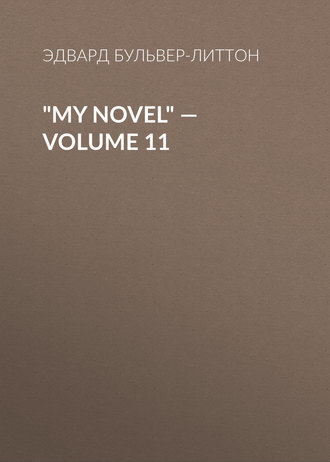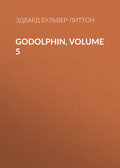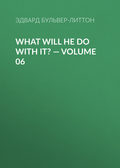
Эдвард Бульвер-Литтон
"My Novel" — Volume 11
CHAPTER III
Whatever the disposition towards merriment at his cousin's expense entertained by the squire, it vanished instantly at the sight of the captain's doleful visage and emaciated figure.
"Very good in you to come to town to see me,—very good in you, cousin, and in you, too, Mr. Dale. How very well you are both looking! I'm a sad wreck. You might count every bone in my body."
"Hazeldean air and roast beef will soon set you up, my boy," said the squire, kindly. "You were a great goose to leave them, and these comfortable rooms of yours in the Albany."
"They are comfortable, though not showy," said the captain, with tears in his eyes. "I had done my best to make them so. New carpets, this very chair—(morocco!), that Japan cat (holds toast and muffins)—just when— just when"—(the tears here broke forth, and the captain fairly whimpered)—"just when that ungrateful, bad-hearted man wrote me word 'he was—was dying and lone in the world;' and—and—to think what I've gone through for him;—and to treat me so! Cousin William, he has grown as hale as yourself, and—and—"
"Cheer up, cheer up!" cried the compassionate squire. "It is a very hard case, I allow. But you see, as the old proverb says, "T is ill waiting for a dead man's shoes;' and in future—I don't mean offence—but I think if you would calculate less on the livers of your relations, it would be all the better for your own. Excuse me!"
"Cousin William," replied the poor captain, "I am sure I never calculated; but still, if you had seen that deceitful man's good-for- nothing face—as yellow as a guinea—and have gone through all I've gone through, you would have felt cut to the heart, as I do. I can't bear ingratitude. I never could. But let it pass. Will that gentleman take a chair?"
PARSON.—"Mr. Fairfield has kindly called with us, because he knows something of this system of homeeopathy which you have adopted, and may, perhaps, know the practitioner. What is the name of your doctor?"
CAPTAIN (looking at his watch).—"That reminds me" (swallowing a globule). "A great relief these little pills—after the physic I've taken to please that malignant man. He always tried his doctor's stuff upon me. But there's another world, and a juster!"
With that pious conclusion the captain again began to weep.
"Touched," muttered the squire, with his forefinger on his forehead. "You seem to have a good—tidy sort of a nurse here, Cousin Barnabas. I hope she 's pleasant, and lively, and don't let you take on so."
"Hist!—don't talk of her. All mercenary; every bit of her fawning! Would you believe it? I give her ten shillings a week, besides all that goes down of my pats of butter and rolls, and I overheard the jade saying to the laundress that 'I could not last long; and she 'd—EXPECTATIONS!' Ah, Mr. Dale, when one thinks of the sinfulness there is in this life! But I'll not think of it. No, I'll not. Let us change the subject. You were asking my doctor's name. It is—"
Here the woman with "expectations" threw open the door, and suddenly announced "DR. MORGAN."
CHAPTER IV
The parson started, and so did Leonard.
The homoeopathist did not at first notice either. With an unobservant bow to the visitors, he went straight to the patient, and asked, "How go the symptoms?"
Therewith the captain commenced, in a tone of voice like a schoolboy reciting the catalogue of the ships in Homer. He had been evidently conning the symptoms, and learning them by heart. Nor was there a single nook or corner in his anatomical organization, so far as the captain was acquainted with that structure, but what some symptom or other was dragged therefrom, and exposed to day. The squire listened with horror to the morbific inventory, muttering at each dread interval, "Bless me! Lord bless me! What, more still! Death would be a very happy release!" Meanwhile the doctor endured the recital with exemplary patience, noting down in the leaves of his pocketbook what appeared to him the salient points in this fortress of disease to which he had laid siege, and then, drawing forth a minute paper said,
"Capital,—nothing can be better. This powder must be dissolved in eight tablespoonfuls of water; one spoonful every two hours."
"Tablespoonful?"
"Tablespoonful."
"'Nothing can be better,' did you say, sir?" repeated the squire, who in his astonishment at that assertion applied to the captain's description of his sufferings, had hitherto hung fire,—"nothing can be better?"
"For the diagnosis, sir!" replied Dr. Morgan.
"For the dogs' noses, very possibly," quoth the squire; "but for the inside of Cousin Higginbotham, I should think nothing could be worse."
"You are mistaken, sir," replied Dr. Morgan. "It is not the captain who speaks here,—it is his liver. Liver, sir, though a noble, is an imaginative organ, and indulges in the most extraordinary fictions. Seat of poetry and love and jealousy—the liver. Never believe what it says. You have no idea what a liar it is! But—ahem—ahem. Cott—I think I've seen you before, sir. Surely your name's Hazeldean?"
"William Hazeldean, at your service, Doctor. But where have you seen me?"
"On the hustings at Lansmere. You were speaking on behalf of your distinguished brother, Mr. Egerton."
"Hang it!" cried the squire: "I think it must have been my liver that spoke there! for I promised the electors that that half-brother of mine would stick by the land, and I never told a bigger lie in my life!"
Here the patient, reminded of his other visitors, and afraid he was going to be bored with the enumeration of the squire's wrongs, and probably the whole history of his duel with Captain Dashmore, turned with a languid wave of his hand, and said, "Doctor, another friend of mine, the Rev. Mr. Dale, and a gentleman who is acquainted with homoeopathy."
"Dale? What, more old friends!" cried the doctor, rising; and the parson came somewhat reluctantly from the window nook, to which he had retired. The parson and the homoeopathist shook hands.
"We have met before on a very mournful occasion," said the doctor, with feeling.
The parson held his finger to his lips, and glanced towards Leonard. The doctor stared at the lad, but he did not recognize in the person before him the gaunt, care-worn boy whom he had placed with Mr. Prickett, until Leonard smiled and spoke. And the smile and the voice sufficed.
"Cott! and it is the poy!" cried Dr. Morgan; and he actually caught hold of Leonard, and gave him an affectionate Welch hug. Indeed, his agitation at these several surprises became so great that he stopped short, drew forth a globule—"Aconite,—good against nervous shocks!" and swallowed it incontinently.
"Gad," said the squire, rather astonished, "'t is the first doctor I ever saw swallow his own medicine! There must be sornething in it."
The captain now, highly disgusted that so much attention was withdrawn from his own case, asked in a querulous voice, "And as to diet? What shall I have for dinner?"
"A friend!" said the doctor, wiping his eyes.
"Zounds!" cried the squire, retreating, "do you mean to say, that the British laws (to be sure they are very much changed of late) allow you to diet your patients upon their fellow-men? Why, Parson, this is worse than the donkey sausages."
"Sir," said Dr. Morgan, gravely, "I mean to say, that it matters little what we eat in comparison with care as to whom we eat with. It is better to exceed a little with a friend than to observe the strictest regimen, and eat alone. Talk and laughter help the digestion, and are indispensable in affections of the liver. I have no doubt, sir, that it was my patient's agreeable society that tended to restore to health his dyspeptic relative, Mr. Sharpe Currie."
The captain groaned aloud.
"And, therefore, if one of you gentlemen will stay and dine with Mr. Higginbotham, it will greatly assist the effects of his medicine."
The captain turned an imploring eye, first towards his cousin, then towards the parson.
"I 'm engaged to dine with my son—very sorry," said the squire. "But Dale, here—"
"If he will be so kind," put in the captain, "we might cheer the evening with a game at whist,—double dummy." Now, poor Mr. Dale had set his heart on dining with an old college friend, and having no stupid, prosy double dummy, in which one cannot have the pleasure of scolding one's partner, but a regular orthodox rubber, with the pleasing prospect of scolding all the three other performers. But as his quiet life forbade him to be a hero in great things, the parson had made up his mind to be a hero in small ones. Therefore, though with rather a rueful face, he accepted the captain's invitation, and promised to return at six o'clock to dine. Meanwhile he must hurry off to the other end of the town, and excuse himself from the pre-engagement he had already formed. He now gave his card, with the address of a quiet family hotel thereon, to Leonard, and not looking quite so charmed with Dr. Morgan as he was before that unwelcome prescription, he took his leave. The squire too, having to see a new churn, and execute various commissions for his Harry, went his way (not, however, till Dr. Morgan had assured him that, in a few weeks, the captain might safely remove to Hazeldean); and Leonard was about to follow, when Morgan hooked his arm in his old /protege/, and said, "But I must have some talk with you; and you have to tell me all about the little orphan girl."
Leonard could not resist the pleasure of talking about Helen; and he got into the carriage, which was waiting at the door for the homoeopathist.
"I am going in the country a few miles to see a patient," said the doctor; "so we shall have time for undisturbed consultation. I have so often wondered what had become of you. Not hearing from Prickett, I wrote to him, and received from his heir an answer as dry as a bone. Poor fellow, I found that he had neglected his globules and quitted the globe. Alas, 'pulvis et umbra sumus!' I could learn no tidings of you. Prickett's successor declared he knew nothing about you. I hoped the best; for I always fancied you were one who would fall on your legs,— bilious-nervous temperament; such are the men who succeed in their undertakings, especially if they take a spoonful of chamomilla whenever they are over-excited. So now for your history and the little girl's,— pretty little thing,—never saw a more susceptible constitution, nor one more suited to pulsatilla."
Leonard briefly related his own struggles and success, and informed the good doctor how they had at last discovered the nobleman in whom poor Captain Digby had confided, and whose care of the orphan had justified the confidence.
Dr. Morgan opened his eyes at hearing the name of Lord L'Estrange. "I remember him very well," said he, "when I practised murder as an allopathist at Lansmere. But to think that wild boy, so full of whim and life and spirit, should become staid enough for a guardian to that dear little child, with her timid eyes and pulsatilla sensibilities. Well, wonders never cease! And he has befriended you too, you say. Ah, he knew your family."
"So he says. Do you think, sir, that he ever knew—ever saw—my mother?"
"Eh! your mother?—Nora?" exclaimed the doctor, quickly; and, as if struck by some sudden thought, his brows met, and he remained silent and musing a few moments; then, observing Leonard's eyes fixed on him earnestly, he replied to the question,
"No doubt he saw her; she was brought up at Lady Lansmere's. Did he not tell you so?"
"No." A vague suspicion here darted through Leonard's mind, but as suddenly vanished. His father! Impossible. His father must have deliberately wronged the dead mother. And was Harley L'Estrange a man capable of such wrong? And had he been Harley's son, would not Harley have guessed it at once, and so guessing, have owned and claimed him? Besides, Lord L'Estrange looked so young,—old enough to be Leonard's father!—he could not entertain the idea. He roused himself and said, falteringly,
"You told me you did not know by what name I should call my father."
"And I told you the truth, to the best of my belief."
"By your honour, sir?"
"By my honour, I do not know it."
There was now a long silence. The carriage had long left London, and was on a high road somewhat lonelier, and more free from houses than most of those which form the entrances to the huge city. Leonard gazed wistfully from the window, and the objects that met his eyes gradually seemed to appeal to his memory. Yes! it was the road by which he had first approached the metropolis, hand in hand with Helen—and hope so busy at his poet's heart. He sighed deeply. He thought he would willingly have resigned all he had won—independence, fame, all—to feel again the clasp of that tender hand, again to be the sole protector of that gentle life.
The doctor's voice broke on his revery. "I am going to see a very interesting patient,—coats to his stomach quite worn out, sir,—man of great learning, with a very inflamed cerebellum. I can't do him much good, and he does me a great deal of harm."
"How harm?" asked Leonard, with an effort at some rejoinder.
"Hits me on the heart, and makes my eyes water; very pathetic case,— grand creature, who has thrown himself away. Found him given over by the allopathists, and in a high state of delirium tremens, restored him for a time, took a great liking to him,—could not help it,—swallowed a great many globules to harden myself against him, would not do, brought him over to England with the other patients, who all pay me well (except Captain Higginbotham). But this poor fellow pays me nothing,—costs me a great deal in time and turnpikes, and board and lodging. Thank Heaven, I'm a single man, and can afford it! My poy, I would let all the other patients go to the allopathists if I could but save this poor, big, penniless, princely fellow. But what can one do with a stomach that has not a rag of its coats left? Stop" (the doctor pulled the check-string). "This is the stile. I get out here and go across the fields."
That stile, those fields—with what distinctness Leonard remembered them. Ah, where was Helen? Could she ever, ever again be, his child-angel?
"I will go with you, if you permit," said he to the good doctor. "And while you pay your visit, I will saunter by a little brook that I think must run by your way."
"The Brent—you know that brook? Ah, you should hear my poor patient talk of it, and of the hours he has spent angling in it,—you would not know whether to laugh or cry. The first day he was brought down to the place, he wanted to go out and try once more, he said, for his old deluding demon,—a one-eyed perch."
"Heavens!" exclaimed Leonard, "are you speaking of John Burley?"
"To be sure, that is his name,—John Burley."
"Oh, has it come to this? Cure him, save him, if it be in human power. For the last two years I have sought his trace everywhere, and in vain, the moment I had money of my own, a home of my own. Poor, erring, glorious Burley! Take me to him. Did you say there was no hope?"
"I did not say that," replied the doctor. "But art can only assist Nature; and though Nature is ever at work to repair the injuries we do to her, yet, when the coats of a stomach are all gone, she gets puzzled, and so do I. You must tell me another time how you came to know Burley, for here we are at the house, and I see him at the window looking out for me."
The doctor opened the garden gate of the quiet cottage to which poor Burley had fled from the pure presence of Leonard's child-angel. And with heavy step, and heavy heart, Leonard mournfully followed, to behold the wrecks of him whose wit had glorified orgy, and "set the table in a roar." Alas, poor Yorick!
CHAPTER V
Audley Egerton stands on his hearth alone. During the short interval that has elapsed since we last saw him, events had occurred memorable in English history, wherewith we have nought to do in a narrative studiously avoiding all party politics even when treating of politicians. The new ministers had stated the general programme of their policy, and introduced one measure in especial that had lifted them at once to the dizzy height of popular power. But it became clear that this measure could not be carried without a fresh appeal to the people. A dissolution of parliament, as Audley's sagacious experience had foreseen, was inevitable. And Audley Egerton had no chance of return for his own seat, for the great commercial city identified with his name. Oh, sad, but not rare, instance of the mutabilities of that same popular favour now enjoyed by his successors! The great commoner, the weighty speaker, the expert man of business, the statesman who had seemed a type of the practical steady sense for which our middle class is renowned,—he who, not three years since, might have had his honoured choice of the largest popular constituencies in the kingdom,—he, Audley Egerton, knew not one single town (free from the influences of private property or interest) in which the obscurest candidate, who bawled out for the new liberal measure, would not have beaten him hollow. Where one popular hustings, on which that grave sonorous voice, that had stilled so often the roar of faction, would not be drowned amidst the hoots of the scornful mob?
True, what were called the close boroughs still existed; true, many a chief of his party would have been too proud of the honour of claiming Andley Egerton for his nominee. But the ex-minister's haughty soul shrunk from this contrast to his past position. And to fight against the popular measure, as member of one of the seats most denounced by the people,—he felt it was a post in the grand army of parties below his dignity to occupy, and foreign to his peculiar mind, which required the sense of consequence and station. And if, in a few months, those seats were swept away—were annihilated from the rolls of parliament—where was he? Moreover, Egerton, emancipated from the trammels that had bound his will while his party was in office, desired, in the turn of events, to be nominee of no man,—desired to stand at least freely and singly on the ground of his own services, be guided by his own penetration; no law for action but his strong sense and his stout English heart. Therefore he had declined all offers from those who could still bestow seats in parliament. Seats that he could purchase with hard gold were yet open to him. And the L5,000 he had borrowed from Levy were yet untouched.
To this lone public man, public life, as we have seen, was the all in all. But now more than ever it was vital to his very wants. Around him yawned ruin. He knew that it was in Levy's power at any moment to foreclose on his mortgaged lands; to pour in the bonds and the bills which lay within those rosewood receptacles that lined the fatal lair of the sleek usurer; to seize on the very house in which now moved all the pomp of a retinue that vied with the valetaille of dukes; to advertise for public auction, under execution, "the costly effects of the Right Hon. Audley Egerton." But, consummate in his knowledge of the world, Egerton felt assured that Levy would not adopt these measures against him while he could still tower in the van of political war,—while he could still see before him the full chance of restoration to power, perhaps to power still higher than before, perhaps to power the highest of all beneath the throne. That Levy, whose hate he divined, though he did not conjecture all its causes, had hitherto delayed even a visit, even a menace, seemed to him to show that Levy still thought him one "to be helped," or, at least, one too powerful to crush. To secure his position in parliament unshackled, unfallen, if but for another year,—new combinations of party might arise, new reactions take place, in public opinion! And, with his hand pressed to his heart, the stern firm man muttered, "If not, I ask but to die in my harness, and that men may not know that I am a pauper until all that I need from my country is a grave."
Scarce had these words died upon his lips ere two quick knocks in succession resounded at the street door. In another moment Harley entered, and, at the same time, the servant in attendance approached Audley, and announced Baron Levy.
"Beg the baron to wait, unless he would prefer to name his own hour to call again," answered Egerton, with the slightest possible change of colour. "You can say I am now with Lord L'Estrange."
"I had hoped you had done forever with that deluder of youth," said Harley, as soon as the groom of the chambers had withdrawn. "I remember that you saw too much of him in the gay time, ere wild oats are sown; but now surely you can never need a loan; and if so is not Harley L'Estrange by your side?"
EGERTON.—"My dear Harley! doubtless he but comes to talk to me of some borough. He has much to do with those delicate negotiations."
HARLEY.—"And I have come on the same business. I claim the priority. I not only hear in the world, but I see by the papers, that Josiah Jenkins, Esq., known to fame as an orator who leaves out his h's, and young Lord Willoughby Whiggolin, who is just made a Lord of the Admiralty, because his health is too delicate for the army, are certain to come in for the city which you and your present colleague will as certainly vacate. That is true, is it not?"
EGERTON.—"My old Committee now vote for Jenkins and Whiggolin; and I suppose there will not be even a contest. Go on."
"So my father and I are agreed that you must condescend, for the sake of old friendship, to be once more member for Lansmere."
"Harley," exclaimed Egerton, changing countenance far more than he had done at the announcement of Levy's portentous visit, "Harley, no, no!"
"No! But why? Wherefore such emotion?" asked L'Estrauge, in surprise.
Audley was silent.
HARLEY.—"I suggested the idea to two or three of the late ministers; they all concur in advising you to accede. In the first place, if declining to stand for the place which tempted you from Lansmere, what more natural than that you should fall back on that earlier representation? In the second place, Lansmere is neither a rotten borough to be bought, nor a close borough, under one man's nomination. It is a tolerably large constituency. My father, it is true, has considerable interest in it, but only what is called the legitimate influence of property. At all events, it is more secure than a contest for a larger town, more dignified than a seat for a smaller. Hesitating still? Even my mother entreats me to say how she desires you to renew that connection."
"Harley," again exclaimed Egerton; and fixing upon his friend's earnest face eyes which, when softened by emotion, were strangely beautiful in their expression,—"Harley, if you could but read my heart at this moment, you would—you would—" His voice faltered, and he fairly bent his proud head upon Harley's shoulder; grasping the hand he had caught nervously, clingingly, "Oh, Harley, if I ever lose your love, your friendship, nothing else is left to me in the world."
"Audley, my dear, dear Audley, is it you who speak to me thus? You, my school friend, my life's confidant,—you?"
"I am grown very weak and foolish," said Egerton, trying to smile. "I do not know myself. I, too, whom you have so often called 'Stoic,' and likened to the Iron Man in the poem which you used to read by the riverside at Eton."
"But even then, my Audley, I knew that a warm human heart (do what you would to keep it down) beat strong under the iron ribs. And I often marvel now, to think you have gone through life so free from the wilder passions. Happier so!"
Egerton, who had turned his face from his friend's gaze, remained silent for a few moments; and he then sought to divert the conversation, and roused himself to ask Harley how he had succeeded in his views upon Beatrice, and his watch on the count.
"With regard to Peschiera," answered Harley, "I think we must have overrated the danger we apprehended, and that his wagers were but an idle boast. He has remained quiet enough, and seems devoted to play. His sister has shut her doors both on myself and my young associate during the last few days. I almost fear that in spite of very sage warnings of mine, she must have turned his poet's head, and that either he has met with some scornful rebuff to incautious admiration or that, he himself has grown aware of peril, and declines to face it; for he is very much embarrassed when I speak to him respecting her. But if the count is not formidable, why, his sister is not needed; and I hope yet to get justice for my Italian friend through the ordinary channels. I have secured an ally in a young Austrian prince, who is now in London, and who has promised to back, with all his influence, a memorial I shall transmit to Vienna.—/a propos/, my dear Audley, now that you have a little breathing-time, you must fix an hour for me to present to you my young poet, the son of her sister. At moments the expression of his face is so like hers."
"Ay, ay," answered Egerton, quickly, "I will see him as you wish, but later. I have not yet that breathing-time you speak of; but you say he has prospered; and, with your friendship, he is secure from fortune. I rejoice to think so."
"And your own /protege/, this Vandal Leslie, whom you forbid me to dislike—hard task!—what has he decided?"
"To adhere to my fate. Harley, if it please Heaven that I do not live to return to power, and provide adequately for that young man, do not forget that he clung to me in my fall."
"If he still cling to you faithfully, I will never forget it. I will forget only all that now makes me doubt him. But you talk of not living, Audley! Pooh! your frame is that of a predestined octogenarian."
"Nay," answered Audley, "I was but uttering one of those vague generalities which are common upon all mortal lips. And now farewell,— I must see this baron."
"Not yet, until you have promised to consent to my proposal, and be once more member for Lansmere. Tut! don't shake your head. I cannot be denied. I claim your promise in right of our friendship, and shall be seriously hurt if you even pause to reflect on it."
"Well, well, I know not how to refuse you, Harley; but you have not been to Lansmere yourself since—since that sad event. You must not revive the old wound,—you must not go; and—and, I own it, Harley, the remembrance of it pains even me. I would rather not go to Lansmere."
"Ah, my friend, this is an excess of sympathy, and I cannot listen to it. I begin even to blame my own weakness, and to feel that we have no right to make ourselves the soft slaves of the past."
"You do appear to me of late to have changed," cried Egerton, suddenly, and with a brightening aspect. "Do tell me that you are happy in the contemplation of your new ties,—that I shall live to see you once more restored to your former self."
"All I can answer, Audley," said L'Estrange, with a thoughtful brow, "is, that you are right in one thing,—I am changed; and I am struggling to gain strength for duty and for honour. Adieu! I shall tell my father that you accede to our wishes."







